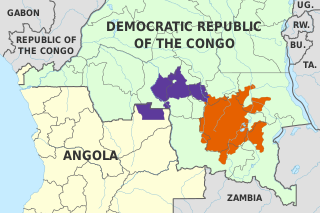Luba-Kasai language
Bantu language spoken in DR Congo From Wikipedia, the free encyclopedia
Luba-Kasai, also known as Cilubà or Tshilubà,[3] Luba-Lulua,[4][5] is a Bantu language (Zone L) of Central Africa and a national language of the Democratic Republic of the Congo, alongside Lingala, Swahili, and Kikongo ya leta.
This article includes a list of general references, but it lacks sufficient corresponding inline citations. (March 2013) |
| Tshiluba, Ciluba | |
|---|---|
| Native to | Angola, Democratic Republic of the Congo |
| Region | Kasai |
| Ethnicity | Baluba-Kasai (Bena-kasai) |
Native speakers | (6.4 million cited 1991–2018)[1] |
| Dialects |
|
| Official status | |
Official language in | Democratic Republic of Congo (national language) |
| Language codes | |
| ISO 639-2 | lua |
| ISO 639-3 | lua |
| Glottolog | luba1249 |
L.31[2] | |
 Location of speakers:
Luba-Kasai
| |
An eastern dialect is spoken by the Luba people of the East Kasai Region and a western dialect by the Lulua people of the West Kasai Region. The total number of speakers was estimated at 6.3 million in 1991.
Within the Zone L Bantu languages, Luba-Kasai is one of a group of languages which form the "Luba" group, together with Kaonde (L40), Kete (L20), Kanyok, Luba-Katanga (KiLuba), Sanga, Zela and Bangubangu. The L20, L30 and L60 languages are also grouped as the Luban languages within Zone L Bantu.
Geographic distribution and dialects
Summarize
Perspective
Tshiluba is chiefly spoken in a large area in the Kasaï Occidental and Kasaï Oriental provinces of the Democratic Republic of the Congo. However, the differences in Tshiluba within the area are minor, consisting mostly of differences in tones and vocabulary, and speakers easily understand one another. Both dialects have subdialects.
Additionally, there is also a pidginised variety of Tshiluba,[2] especially in cities, where the everyday spoken Tshiluba is enriched with French words and even words from other languages, such as Lingala or Swahili. Nevertheless, it is not a typical form of a pidgin since it is not common to everyone but changes its morphology and the quantity and degree to which words from other languages are used. Its form changes depending on who speaks it and varies from city to city and social class to social class. However, people generally speak the regular Tshiluba language in their daily lives, rather than pidgin.
The failure of the language to be taught at school has resulted in the replacement of native words by French words for the most part. For instance, people speaking generally count in French, rather than Tshiluba. The situation of French and Tshiluba being used simultaneously made linguists mistakenly think that the language had been pidginised.[citation needed]
Vocabulary
| Western dialects | Eastern dialects | English |
|---|---|---|
| meme | mema | me |
| ne | ni | with |
| nzolo/nsolo | nzolu | chicken |
| bionso | bionsu | everything |
| luepu | mukela (e) | salt |
| kapia | mudilu | fire |
| bidia | nshima | maize meal |
| makelela | malaba | yesterday/ tomorrow |
| lupepe | luhepa | wind |
| Mankaji (shi)/tatu mukaji | tatu mukaji | aunty |
| bimpe | bimpa | well/good |
Alphabet
Luba-Kasai uses the Latin alphabet, with the digraphs ng, ny and sh but without the letters q, r and x:[6]
Phonology
Tshiluba has a 5 vowel system with vowel length:
The chart shows the consonants of Tshiluba.
- /p/ may also have the sound [ɸ].
- If a /d/ is preceding an /i/, it may also be pronounced as an affricate sound [dʒ].
Sample text
According to The Rosetta Project,[7] Article 1 of the Universal Declaration of Human Rights translates to:
- Bantu bonsu badi baledibwa badikadile ne badi ne makokeshi amwe. Badi ne lungenyi lwa bumuntu ne kondo ka moyo, badi ne bwa kwenzelangana malu mu buwetu.
- "All human beings are born free and equal in dignity and rights. They are endowed with reason and conscience and should act towards one another in a spirit of brotherhood."
According to Learn Tshiluba (Mofeko):
- Mukayi wuani udi mu bujimi
- "My wife is on the farm"[8]
- Mulunda wanyi mujikija kalasa Uenda mu tshidimu tshishala
- "My friend completed his/her studies last year" [9]
References
Bibliography
External links
Wikiwand - on
Seamless Wikipedia browsing. On steroids.
